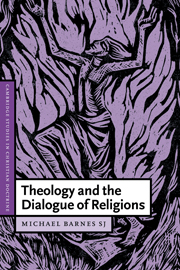8 - Contemplating the depths of God
Published online by Cambridge University Press: 04 December 2009
Summary
The confession, that in Jesus of Nazareth is revealed the very presence and promise of God for humankind, is made against the background of what I have called a ‘context of otherness’. By this term I do not refer only to the originating story of the one who challenges all human logic and wisdom by undergoing death–though it is clearly this story which takes the lead in the formation of Christian faith. I also mean the continuing story of a community of faith which recognises in its own sometimes fraught and broken relations with people of other faiths a trace of the God who is always other and beyond all imaginings. In the previous chapter, I tried to bring these two dimensions together. When the Christian community gathers to celebrate the Eucharist, it does not enact a ritual which subsumes all meaning into some predetermined interpretive scheme, but is itself formed and reformed by God's own work of ‘re-membering’, in the literal sense of putting back together. Liturgy–the ‘work of the people’–makes the Church. It thus enables the Christian habitus: notably, in a world of many faiths, a contemplative and ethical sensitivity to the action of God's Spirit wherever it is to be discerned. A measure of passivity or patience is, therefore, intrinsic to Christian personhood. Or, to put it the other way round, a properly Christian response to the God who speaks requires time and discernment.
- Type
- Chapter
- Information
- Theology and the Dialogue of Religions , pp. 205 - 229Publisher: Cambridge University PressPrint publication year: 2002



